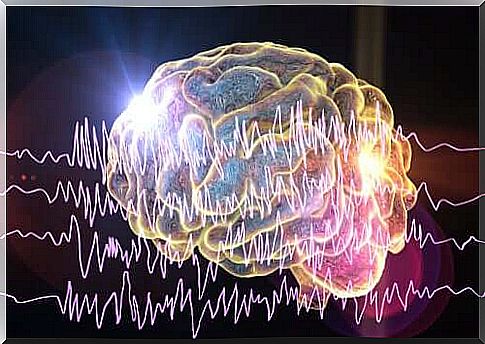Psychological Support In Epilepsy

Epilepsies are diseases of the central nervous system that manifest through seizures resulting from a temporary dysfunction of neurons. The balance between excitatory and inhibitory neurons shifts and many nerve cells are fired too strongly at the same time. In this article, we are going to talk specifically about psychological support in epilepsy.
There are different types of seizures, as the brain may be involved in its entirety or only in some parts. The crisis may originate in one part of the brain and then spread to the rest.
We do not speak of epilepsy when it is a single seizure under special circumstances (eg from intoxication, lack of oxygen, febrile seizures). Epilepsy is only mentioned when the seizures are repeated.

Causes of epilepsy and forms of seizures
Epilepsy usually arises from an innate predisposition or acquired brain damage. Brain injuries most often occur during the prenatal period, childbirth, or early childhood. They can also be caused by infections, wounds, brain tumors, hemorrhages, intoxications, poor vascularization, etc.
It should be noted that most epileptics do not have an evolutionary brain disease, but repeated crises that are more or less controlled by medication.
How do different epileptic seizures manifest themselves?
The clinical expression of seizures depends on the type of epilepsy and can vary to manifest in the following ways:
- The patient abruptly interrupts his activity, remains trapped for a few seconds, with a fixed or lost gaze; then it resumes the interrupted activity.
- Shows uncontrolled muscle contractions for a few moments.
- Suddenly, he falls into a state of confusion and his movements become uncontrolled.
- He falls, loses consciousness, becomes rigid and has convulsions in his head and limbs.
Other forms of expression of crises would be stereotyped movements, tapping , blinking, salivation, vomiting, shortness of breath, loss of urine or feces, etc. In some epileptic people, the seizure is heralded by warning signs (aura).
In general, epileptic seizures do not last very long and usually end on their own, except in cases of status epilepticus. Some physiological functions are also out of control during seizures.
Epilepsy treatment
Most epilepsies are sensitive to pharmacological treatment. Often, a single drug (monotherapy) is enough for treatment, although in some cases two or more (polytherapy) are needed.
In general, it is recommended to take antiepileptic drugs for several years. In case of drug resistance, ie when severe or frequent seizures persist, surgical intervention may be an option.
Psychological support in epilepsy
The diagnosis forces the patient and his family to face a new situation. People who discover epilepsy and receive support generally cope better with their attacks and emotions and are better equipped to defend their own interests.
Learning about epilepsy is an important first step. Joining an association, talking to an expert, or joining a support group are all excellent ways to gain information and understanding.
Some people turn to a health professional or psychologist for psychological support. In this sense, it is important to build a support network around the person with epilepsy: people who can provide fundamental support.
Other problems are less visible, but equally important: acceptance of the disease, management of well-founded and unfounded anxiety, family difficulties, plans for the future, etc.
It is recommended to get the patient involved in the management of their epilepsy. Take control, manage your attitudes, observe the circumstances surrounding a crisis, eliminate these circumstances or modify them through preventive measures. Finally, if possible, find and apply a method of intervention that will help control seizures.
Collaboration between professionals from the patient’s childhood
To provide adequate care and psychological support for children with epilepsy, it is important to understand the neurological and emotional factors that cause their symptoms. We are talking about a very difficult job, as there is always a close interaction of these factors.
This is a permanent question created during informal discussions between the various stakeholders and during the synthesis meetings during the follow-up of the children.
The pediatric neurologist, in collaboration with the neuropsychologist, prepares a neuropsychological assessment of the abilities and difficulties of each child, comparing the table of cognitive disorders – usually described in the type of epilepsy presented by the child – with the cognitive disorders actually observed.
This gives an initial idea of which disorders are likely to be due to neurological disease.
Communication of professionals with the patient and their surroundings
Interviews with children and adolescents by psychologists are used to convey the experiences of epilepsy and its consequences, often experienced as humiliating and saddening. It is about seeing the reality of things, future prospects and personal goals according to individual capabilities.
Every caregiver and professional will have to teach the child to assess their possibilities and the risks that precipitate the onset of the crisis. Parents of children with epilepsy are often familiar with the adjustments and can tell both them and their caregivers how to act when the patient has an epileptic seizure.
Knowing how to regulate oneself emotionally between epilepsy crises
Many people with epilepsy find that their emotions and feelings affect the frequency of their seizures. As a result, learning to better manage emotions can reduce the amount of attacks.
It is possible to change attitudes; for example, not seeing yourself as an “epileptic”, or focusing on the things you can do rather than the things you cannot do.
Crisis prevention can be facilitated through stress management through relaxation techniques such as yoga or journaling.
Other important measures can help prevent seizures: get enough sleep, exercise regularly to avoid hyperventilation, eat regular balanced and nutritious meals, avoid caffeine, sweeteners, alcohol, drugs, and always take medications at the prescribed time.

What to do in the face of an epilepsy crisis?
Suddenly, the person who is in crisis becomes strange, inaccessible and incomprehensible. It is common for this phenomenon to be combined with the observer’s feeling of impotence. This is also one of the reasons why being well informed is one of the conditions necessary to reduce anxiety and provide the correct physical and psychological support in the face of an epilepsy crisis.
During a generalized tonic-clonic seizure:
- Keep Calm.
- Transport the person out of any hazardous area to avoid injury.
- Place a pillow or clothing under your head.
- Take off your glasses.
- Make your breathing easier by loosening your clothes, especially around your neck.
- Look at your watch to see how long the crisis lasts.
At the end of the convulsions:
- Place the person in a lateral safety position (preferably on the left).
- Clear your airway to let out saliva or vomit.
- Stay with the affected person while the confusion persists.
- If necessary, give her the opportunity to rest.
It is essential that, except in particularly benign cases, the epileptic patient is the object of an individualized reception project at school and/or another environment that he/she attends daily.









